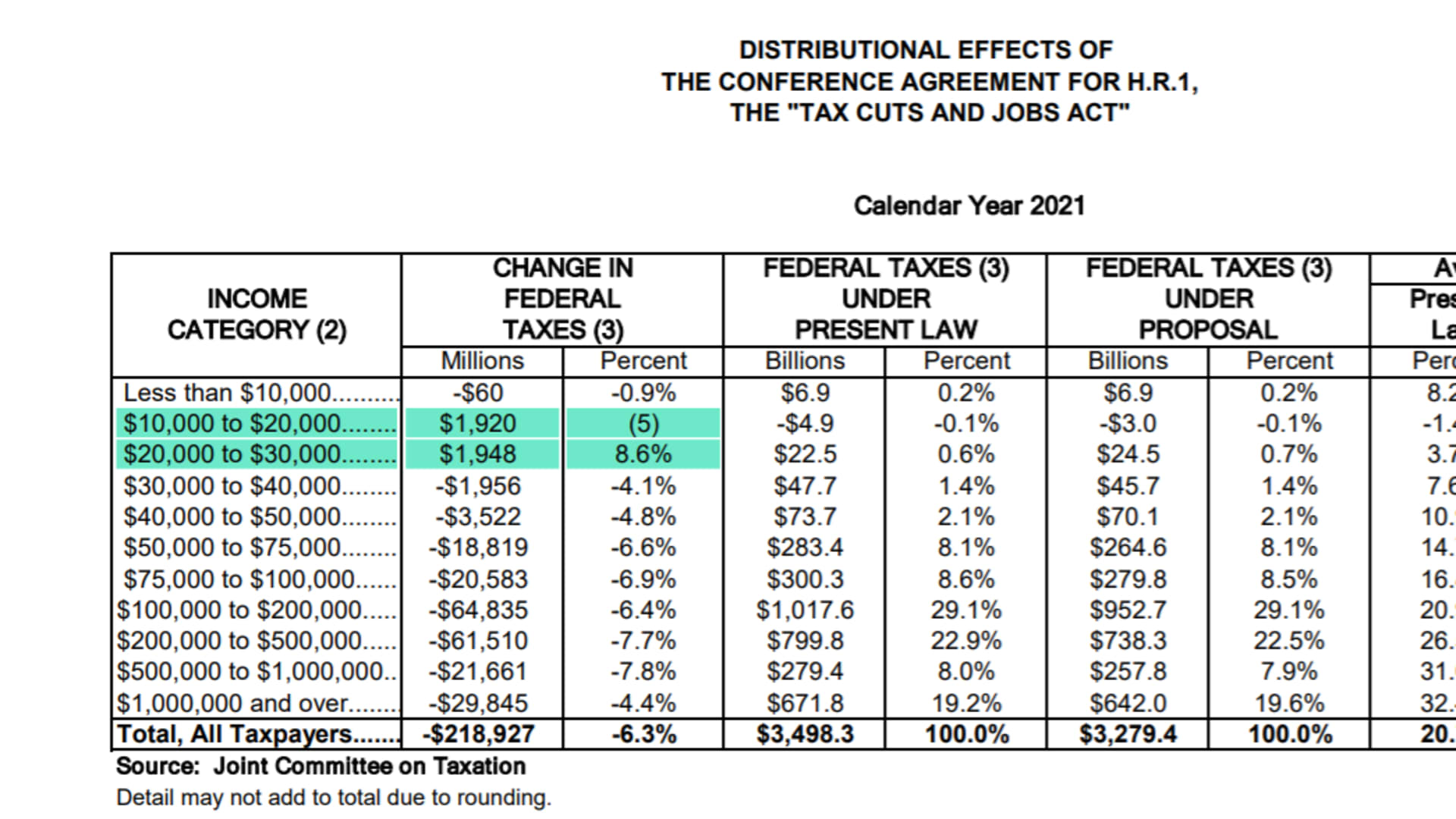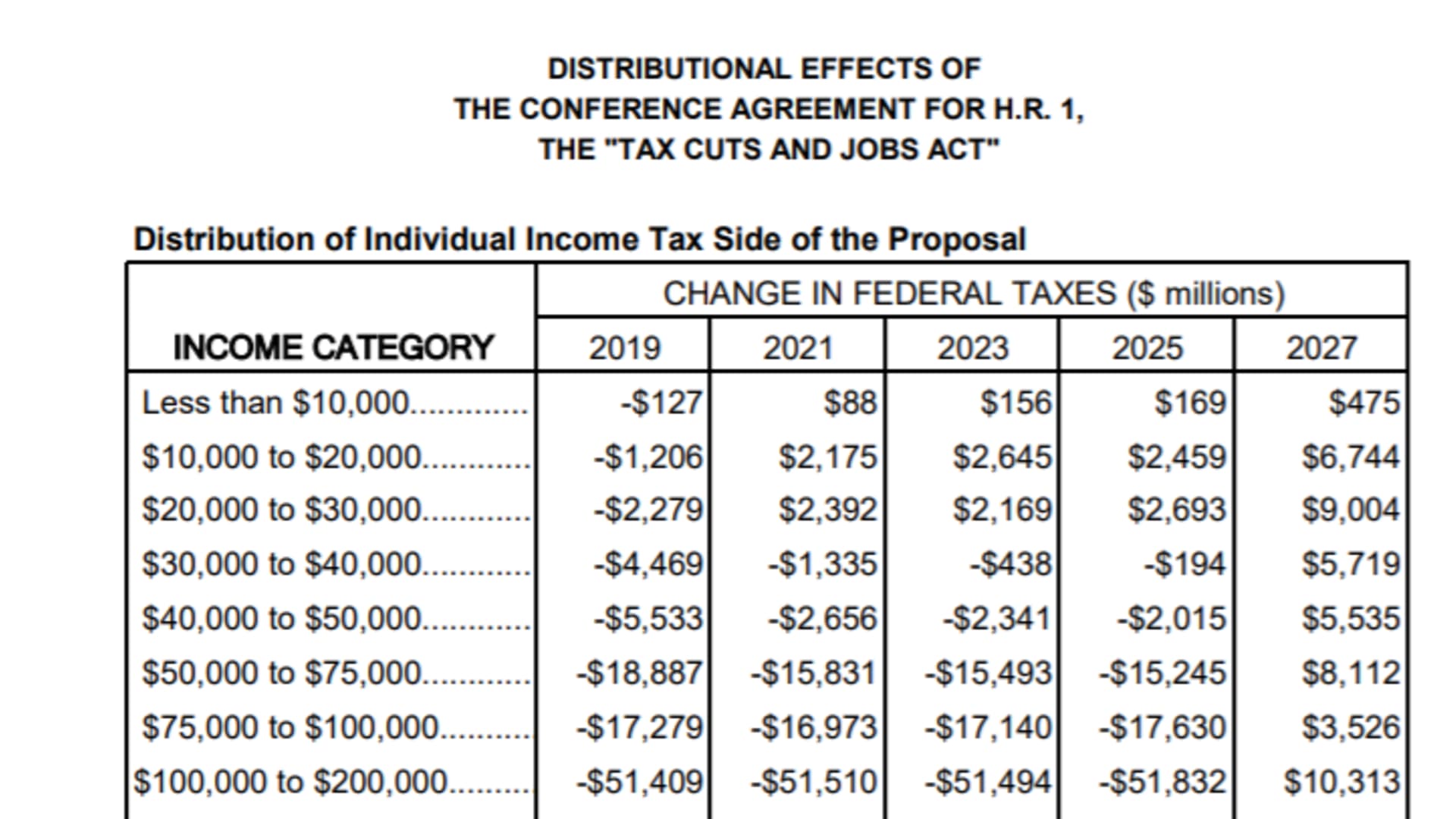
Spend some time on Reddit or Twitter and you might be concerned that taxes are going up next year, thanks to a misunderstood chart from the Joint Committee on Taxation (JCT).
The chart, which was created in December 2017 when the Tax Cuts and Jobs Act (TCJA) was passed, periodically makes the rounds on social media because it seems to show that people earning between $10,000 to $30,000 begin paying more in taxes on average starting in 2021 than they would have before the law was passed.
See the highlighted cells below, which were the JCT's estimates for the average changes in federal taxes for those earning between $10,000 and $30,000 in 2021. That the highlighted cells are positive numbers, not negative like in the higher income groups, shows that lower-income groups would start paying more in taxes on average in 2021:

But that's not quite true, says Garrett Watson, senior policy analyst at the Tax Foundation. The vast majority of people received a tax cut when the law passed, with the highest earners receiving a bigger break than lower-income individuals. That doesn't change next year (take a look at the federal tax brackets for this year and next).
Why, then, does the chart show an increase in taxes for low-income individuals? As with anything related to taxes in the U.S., the answer is complicated. But essentially, the increase can be attributed to the Affordable Care Act's individual mandate penalty, which was reduced to $0 in 2019, says Watson.
Under the ACA, individuals within 100% and 400% of the federal poverty level are eligible to receive premium tax credits to offset the cost of their health-care plans. The JCT's analysis assumes that without the individual mandate penalty, fewer people in this income range will sign-up for insurance each year. That means fewer people will receive those tax credits, says Watson, which would affect the average tax rate (as seen in the chart).
Money Report
"Individuals are voluntarily opting out of insurance and the related premium tax credits they could otherwise receive," says Watson. "It is not comparable to a direct tax hike."
Some under-the-radar provisions in the TCJA could increase taxes
While there's nothing in the TCJA that explicitly bumps up tax rates in 2021, there is another provision in the tax code that could cause some people to pay more than they would have otherwise, says Mark Mazur, director of the Urban-Brookings Tax Policy Center.
The law changed how inflation is calculated in the tax code, which affects tax brackets and eligibility for some deductions. Instead of tying inflation to the traditional consumer price index, as it was before, the IRS now measures inflation using the so-called "chained" CPI.
Chained CPI measures inflation "more slowly," says Mazur, so the IRS adjusts tax brackets upward more slowly. For tax payers, that means they'll likely be pushed into a higher tax bracket faster because of cost-of-living salary increases or annual raises. You'll pay taxes at a higher rate, though you won't necessarily feel like you're earning more.
Individuals will also phase out of tax benefits like the Earned Income Tax Credit more quickly as a result.
Overall, the difference is slight, around a few tenths of a percentage point a year, says Mazur, and it has been in effect since the TCJA was enacted. Still, over time, those slight differences can compound.
Individual tax cuts begin to expire after 2025
Almost all of the individual tax cuts do expire at the end of 2025, unless Congress extends them. That means the old, higher tax rates would return, including the top rate of 39.6% (the TCJA changed the top rate to the current 37%). Corporate tax cuts enacted as part of the law do not expire, nor does the new inflation calculation.
Taxes will increase because of the process Congress used to pass the law, known as the budget reconciliation process. This is an expedited process for legislation that can be used for changes to federal spending, budgets and debt limits. In the Senate, it allows for the passage of legislation with a simple majority, blocking a filibuster from the opposing party. It's been used to pass Reagan- and Bush-era tax cuts and the Affordable Care Act.
In order to use this process to pass the bill, the TCJA could not increase the long-term budget deficit, defined as 10 years. To meet that requirement, the individual tax cuts were written to phase out after 2025.
Republicans could have chosen to have the corporate tax cuts expire, rather than the individual tax cuts, to meet the requirements of the budget reconciliation process, says Mazur. Deciding that individual tax cuts should lapse but not corporate rates was strictly "an expression of the policy preferences of the policy makers," he says.
Here's a simplified table showing how the TCJA affects taxes from 2021 to 2027, using the same analysis from the JCT noted above:

Also expiring at the end of 2025: the increased standard deduction, elimination of the personal exemption and doubling of the child tax credit.
Don't miss: Highest-ever Amex Gold Card welcome bonus is worth up to $600 in gift cards






